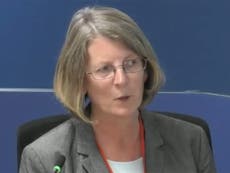Grenfell inquiry: Former insulation product manager describes ‘completely unethical’ acts at firm
Celotex ex-worker claims company was ‘dishonest’ by ‘overengineering’ cladding fire safety test to achieve pass
Your support helps us to tell the story
From reproductive rights to climate change to Big Tech, The Independent is on the ground when the story is developing. Whether it's investigating the financials of Elon Musk's pro-Trump PAC or producing our latest documentary, 'The A Word', which shines a light on the American women fighting for reproductive rights, we know how important it is to parse out the facts from the messaging.
At such a critical moment in US history, we need reporters on the ground. Your donation allows us to keep sending journalists to speak to both sides of the story.
The Independent is trusted by Americans across the entire political spectrum. And unlike many other quality news outlets, we choose not to lock Americans out of our reporting and analysis with paywalls. We believe quality journalism should be available to everyone, paid for by those who can afford it.
Your support makes all the difference.A former employee of the makers of flammable insulation used on Grenfell Tower has described the “completely unethical” acts allegedly carried out at the firm to compete with rival companies.
Jonathan Roper, the ex-assistant product manager at Celotex, told the inquiry into the 2017 fire the firm was “dishonest” by “overengineering” a cladding fire safety test to achieve a pass for its Rs5000 insulation product.
After a first test failure in January 2014, a second system passed four months later, which the firm used to erroneously market the combustible rigid foam boards as being safe for use on high-rise buildings, the public inquiry heard.
On Monday, the inquiry was told Celotex added a 6mm fire-resisting magnesium oxide board to a cladding test rig made up of 12mm fibre cement panels for the second test.
The inquiry heard 8mm fibre cement panels were added over the magnesium oxide to “conceal” its presence, making the whole system almost flush – but for the 2mm difference.
Mr Roper agreed with the inquiry’s chief lawyer Richard Millett QC that the decision to use “a thinner layer was to make it less noticeable there was something else behind it”, which would help “see off any prospect of anyone asking questions”.
Asked whether that struck him at the time as “dishonest”, Mr Roper replied: “Yes, it did.”
He added: “I went along with a lot of actions at Celotex that, looking back on reflection, were completely unethical and that I probably didn’t potentially consider the impact of at the time.
“I was 22 or 23, first job, I thought this was standard practice albeit it did sit very uncomfortably with me.
Mr Roper claimed his superiors ordered the removal of any mention of the magnesium oxide in marketing literature, which he agreed was “misleading and intended to mislead”.
Mr Millett asked: “Did you realise at the time that if this was how the test was to be described to the market it would be a fraud on the market?”
Mr Roper said: “Yes I did. I felt incredibly uncomfortable with it. I felt incredibly uncomfortable with what I was asked to do.”
Mr Roper said there was no one in the firm he could speak to about his concerns.
He has told the inquiry all his work was overseen by product manager Paul Evans, and that the motivation for getting the Rs5000 product to market was to compete with rival firm Kingspan and its K15 insulation.
The inquiry has previously heard Celotex saw Grenfell as a “flagship” for its product and allegedly exploited the “smoke of confusion” which surrounded building regulations at the time.
Celotex, part of the French multinational Saint-Gobain group, has maintained it promoted Rs5000’s use on buildings taller than 18m only on a “rainscreen cladding system with the specific components”, used when it passed the fire safety test.
In its opening statement for module two of the inquiry, the firm said: “In the course of investigations carried out by Celotex after the Grenfell Tower fire, certain issues emerged concerning the testing, certification and marketing of Celotex's products ... These matters involved unacceptable conduct on the part of a number of employees.”
Module two, the latest stage in the inquiry, is scrutinising the production, testing and sale of the materials used in the revamp of the 23-storey tower block in North Kensington, west London, before the fire on 14 June 2017 which claimed 72 lives.
The proceedings continue.
Additional reporting by PA





